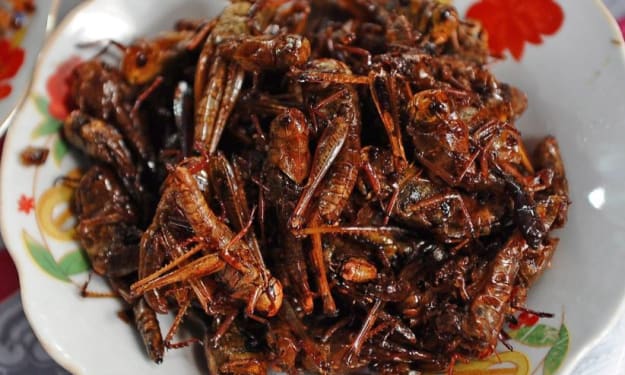The Vegan Diet: A Look at Sustainability
New Vegan Exploring the Science Behind Veganism

Vegan. What is the first thing that comes to your mind? Do you think, strange, minority, or health freak? Do you think, “Oh, Lisa at work is a vegan, a little nutty, that one…”? When you hear the term vegan, you already start to think of someone who is different. Being vegan, you are placed into a category which is unique from the rest of humanity. Vegans go against cultural and social norms and traditions.
When I became a vegetarian a couple of years ago, I could not imagine becoming a vegan. The first thing I thought about were all the things I would have to go without. I still ate eggs for breakfast, drank milk, and loved cheese, although I had given up meat. The preliminary step of giving up meat is difficult within itself. If you were raised a meat eater, and it was a staple of your diet, the flavor of the meat and also the nutritional value are things you will miss. Imagining giving up all animal products?! Sounds like a challenging task. At the time I remember thinking, “I don’t know how to do it and I am uneducated on a vegan diet.”
Becoming a vegan wasn’t completely my idea. It clicked when someone I met at work convinced me to become completely vegan (giving up milk and cheese, I wasn’t doing eggs). I don’t regret becoming a vegan. I am joyous in the fact that I do not eat anything that would potentially harm an animal. I also feel as if it is better for my health. Being a health conscious person, I must ask myself, is veganism the best diet in the world? There is much controversy over this topic. Listening to testimonials on YouTube, many people share why they switched from being vegan back to eating meat for health reasons. Other YouTube videos I have viewed contrast the testimonials. These videos include seemingly important individuals, standing in front of a crowd, preaching that veganism is the best way to live your life. I am a couple months into being a vegan and I do not see myself switching back to being a carnivore. I have noticed changes within myself, and because of what YouTube has taught me, I wonder if these changes are because of my vegan diet. Does being a vegan have greater health benefits? Should humans be on a vegan diet?
Since 1994, the number of vegetarians in the United States has doubled (Budgar, 2017). Around 7 million Americans are vegetarian, which includes around 3 percent of the population (Budgar, 2017). Veganism is associated with lower risk of heart disease, type 2 diabetes and obesity, as well as overall cancer rates (Budgar, 2017). Veganism has spread rapidly among the vegetarian population, as well (Budgar, 2017). The Daniel Fast, which is a vegan religious fast, also restricting the diet to no caffeine, alcohol, additives or preservatives, shows an improvement in the cardiometabolic rate in men and women (Alleman, 2013). From personal experience, my cardiovascular health feels much stronger now that veganism has been incorporated into my life. Significant reduction in total cholesterol and LDL-cholesterol, but also a decrease in HDL-cholesterol are prevalent in men and women (Alleman, 2013). There was also similar effects on blood lipids (Alleman, 2013). Oxidative stress was lower in participants, as well as a reduction in malondialdehyde (MDA) and hydrogen peroxide (Alleman, 2013). Systemic inflammation was reduced as well as a reduction in C-reactive protein (Alleman, 2013). Systemic inflammation and oxidative stress are both linked to age related diseases as well as aging (Alleman, 2013). Blood pressure, body weight, and body fat percentage all decreased after participants finished the vegan Daniel Fast (Alleman, 2013). The decrease in HDL-cholesterol and lean body mass are the downfalls to this fast (Alleman, 2013). The downfalls again to this fast may leave you believing veganism is bad, or fasting is bad, but there are ways to supplement these deficiencies. For instance, a study done on Asian Indians with type 2 diabetes showed that cashew nuts reduced systolic blood pressure and increased HDL cholesterol concentrations (Mohan & Viswanathan, 2018). This shows evidence there is a plant based resource which we can turn to for higher HDL cholesterol levels. There have also been a study suggesting that whey protein supplementation over an 8-16 week period, shows a greater increase in lean body mass than supplementation with carbohydrate and placebo in collegiate female basketball players (Taylor & Lemuel, 2016). From this statement, we can determine whey protein can be a supplement to increase lean body mass even on a vegan diet. Small amounts of low fat meat added to the Daniel fast did show a better ratio of cholesterol to HDL-cholesterol, although some data has linked meat to higher risk for disease (Alleman, 2013). Omega 6 and Omega 3 fatty acids are important when studying changes in HDL cholesterol levels (Alleman, 2013). When comparing groups who participated in the Daniel Fast who get their sources from salmon or walnuts, the ratio for LDL:HDL cholesterol was stronger for those who ate walnuts, while the participants who ate the salmon had higher HDL cholesterol (Alleman, 2013). Although higher HDL cholesterol is important, a stronger ratio is deemed more important and shows clinical significance that walnuts are a better source of omega 3 and 6 fatty acids than salmon (Alleman, 2013). The study of the Daniel Fast participants does show that when lean meat and dairy was added to the diet, there were potentially more favorable health benefits (Alleman, 2013). Although this study does conclude that lean meat and dairy are beneficial, did the researchers look into vegan options for correcting the HDL cholesterol levels and the lipid panel ratios which were deemed worse on the traditional Daniel Fast? I have already provided a vegan alternative which could correct the low HDL cholesterol problem. I am sure there could be a vegan way to help with the lipid panel ratio deficiency, which is something the researchers who wrote this article have not looked into.
When you are a kid, you are told to drink milk for strong bones. Our western world minds link dairy as being an important source of calcium. Are our bones healthy without dairy? According to Ho- Pham (2012), a higher intake of animal products are associated with bone loss in postmenopausal women. Vitamin D amounts were lower in vegans compared to non-vegans (Ho-Pham, 2012). Bone mineral density is lower in those who are vegan, yet fracture risk is not higher (Ho-Pham, 2012). None of the statistical differences were particularly significant in bone mineral density (Ho-Pham, 2012). Although bone mineral density is lower in the vegetarian/vegan population, it is not linked to greater risk bone loss in aging, nor greater risk for fracture (Ho-Pham, 2012). Vegetarianism does not have adverse effects on bone health (Ho-Pham, 2012). This research shows us that vegans and vegetarians might have a lower bone mineral density, but that overall, bone health is not affected. That still leaves a question of where would a person be able to make up for the calcium which they are not getting from their milk? Vegan calcium sources include beans, pulses and green vegetables while bok choy, broccoli and kale are particularly high in calcium (Rogerson, 2017). Calcium fortified foods such as nut milk, soy milk and some fruit juices may be a good option (Rogerson, 2017).
Iodine deficiency has been linked to a restricted vegan diet (Yeliosof, Olga, & Silverman, 2018). Iodine is an important part of thyroid hormones triiodothyronine and thyroxine, and when diet intake is insufficient in iodine, the depletion of this thyroid hormone in the body takes place (Yeliosof, Olga, & Silverman, 2018). Cow’s milk is the primary source of dietary iodine in the United States (Yeliosof, Olga, & Silverman, 2018). Veganism could be debunked if there were no other plant based foods containing iodine, but there is hope. High intake of iodine rich seaweed or kelp can supplement the diet of those who do not consume iodine rich dairy (Tokudome, 2012). Concentrations of iodine found in seaweed are 100-1000 times higher than iodine found in fish (Tokudome, 2012). Seaweed having a stronger iodine source than fish shows that plant based nutrition can be the better choice over its competing animal alternatives.
Taking care of overall health does not only include a healthy diet, but also includes physical activity and exercise. How will one's physical health be on a vegan diet is probably a concern for people who are thinking to adopt this lifestyle. Will one have the same energy level? Will a human body be able to recover the same if one is not getting the high protein found in animal products? Some have claimed that vegan diets could offer performance benefits due to antioxidants, vitamin C and E, and carbohydrate rich foods which aid in performance and recovery (Rogerson, 2017). It has been suggested that milk is a better quality protein source, compared to its soy counterpart, because of its rich BCAA content, amino acids, and particularly the amino acid lysine (Rogerson, 2017). Beans and legumes are a rich source of lysine, while other BCAA’s are prevalent in tree seeds, nuts and chickpeas, which means milk is not the only source for amino acids (Rogerson, 2017). Plant based supplementation is not as well researched, along with veganism in athletics, at this time (Rogerson, 2017). Vegan diets are higher in fruits, vegetables, carbohydrates, fiber, antioxidants and phytochemicals, which may be helpful in healing inflammation and also promoting recovery from training (Rogerson, 2017). Some athletes prefer a vegan diet to maintain a healthy weight and also to meet carbohydrate needs (Rogerson, 2017). A vegan can also supplement their diet with microalgae oil to obtain n -3 fatty acid, which they are lacking from a no fish diet (Rogerson, 2017). N -3 fatty acid is important for athletic performance (Rogerson, 2017). 50 percent more zinc should be consumed by those on a vegan diet than those on an omnivorous diet (Rogerson, 2017). This can be supplemented with pumpkin seeds or hemp, and other grains, legumes and nuts (Rogerson, 2017). Nutritional needs for athletes can be achieved on a vegan diet (Rogerson, 2017). Athleticism and veganism seem to go hand in hand and provides benefits over athletes meat eating counterparts.
Studying veganism is something that is important to me because of myself being a vegan and making this decision in my twenties. After researching and taking into consideration that veganism is still a minority population worldwide, it is going to be easy to argue that animal products are necessary for the human diet, because it is what we have known. Veganism gaining popularity recently does not give us a strong base to study what is best for vegans and nutrition. It is probably overlooked as a lifestyle and does not have a lot of research that it deserves. We are surviving beings on the planet, just like animals are, and we are designed to consume the nutrients which they do as well, not the animal. Where ever we lack a nutrient from an animal, it seems there is a way to receive this through a plant based source. This paper brings hope that people will consider a vegan diet because it is an ethical choice, as well as a nutritionally beneficial one!
Bibliography
Alleman, Rick J., et al. "Both a traditional and modified Daniel Fast improve the cardio-metabolic profile in men and women." Lipids in Health and Disease, vol. 12, no. 1, 2013. Academic OneFile, http://link.galegroup.com.ezproxy.spalding.edu:8080/apps/doc/A534665934/AONE?u=lou40555&sid=AONE&xid=4ab44090. Accessed 22 Nov. 2018.
Budgar, L. (2017). VEGANISM ON THE RISE. AMASS, 22(1), 38+. Retrieved from http://link.galegroup.com.ezproxy.spalding.edu:8080/apps/doc/A512288950/AONE?u=lou40555&sid=AONE&xid=c35ea477
Ho-Pham, L.T., et al. "Vegetarianism, bone loss, fracture and vitamin D: a longitudinal study in Asian vegans and non-vegans." European Journal of Clinical Nutrition, vol. 66, no. 1, 2012, p. 75+. Academic OneFile, http://link.galegroup.com.ezproxy.spalding.edu:8080/apps/doc/A277270613/AONE?u=lou40555&sid=AONE&xid=e3ba3b17. Accessed 22 Nov. 2018.
Mohan, Viswanathan, et al. "Cashew Nut Consumption Increases HDL Cholesterol and Reduces Systolic Blood Pressure in Asian Indians with Type 2 Diabetes: A 12-Week Randomized Controlled Trial." The Journal of Nutrition, vol. 148, no. 1, 2018, p. 63+. Academic OneFile, http://link.galegroup.com.ezproxy.spalding.edu:8080/apps/doc/A528468300/AONE?u=lou40555&sid=AONE&xid=c6bdbc71. Accessed 22 Nov. 2018.
Rogerson, David. "Vegan diets: practical advice for athletes and exercisers." Journal of the International Society of Sports Nutrition, vol. 14, no. 1, 2017. Academic OneFile, http://link.galegroup.com.ezproxy.spalding.edu:8080/apps/doc/A509098770/AONE?u=lou40555&sid=AONE&xid=3e449a1a. Accessed 22 Nov. 2018.
Taylor, Lemuel W., et al. "Eight weeks of pre- and postexercise whey protein supplementation increases lean body mass and improves performance in Division III collegiate female basketball players." Applied Physiology, Nutrition, and Metabolism, vol. 41, no. 3, 2016, p. 249+. Academic OneFile, http://link.galegroup.com.ezproxy.spalding.edu:8080/apps/doc/A446934658/AONE?u=lou40555&sid=AONE&xid=8f9ff886. Accessed 22 Nov. 2018.
Tokudome, S., et al. "Dietary iodine sources other than fish." European Journal of Clinical Nutrition, vol. 56, no. 5, 2002, p. 467+. Academic OneFile, http://link.galegroup.com.ezproxy.spalding.edu:8080/apps/doc/A197929384/AONE?u=lou40555&sid=AONE&xid=6f3c3351. Accessed 22 Nov. 2018.
Yeliosof, Olga, and Lawrence A. Silverman. "Veganism as a cause of iodine deficient hypothyroidism." Journal of Pediatric Endocrinology and Metabolism, vol. 31, no. 1, 2018, p. 91+. Academic OneFile, http://link.galegroup.com.ezproxy.spalding.edu:8080/apps/doc/A525404697/AONE?u=lou40555&sid=AONE&xid=d32bf8da. Accessed 22 Nov. 2018.
About the Creator
Emily McGrath
Almost raw vegan, at least for the summer... love books, jogging, yoga and of course, long romantic walks on the beach! I hope you enjoy what I write, I love doing it!






Comments
There are no comments for this story
Be the first to respond and start the conversation.